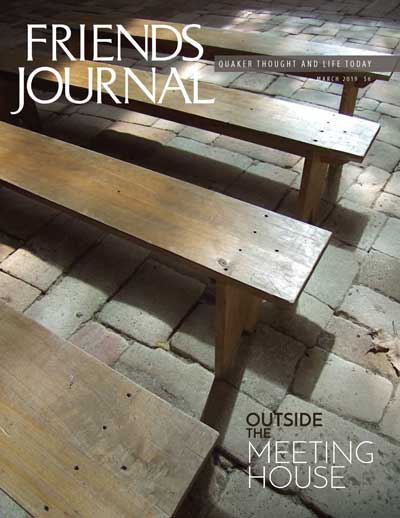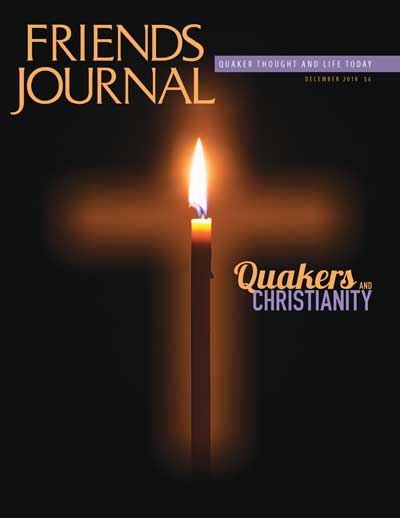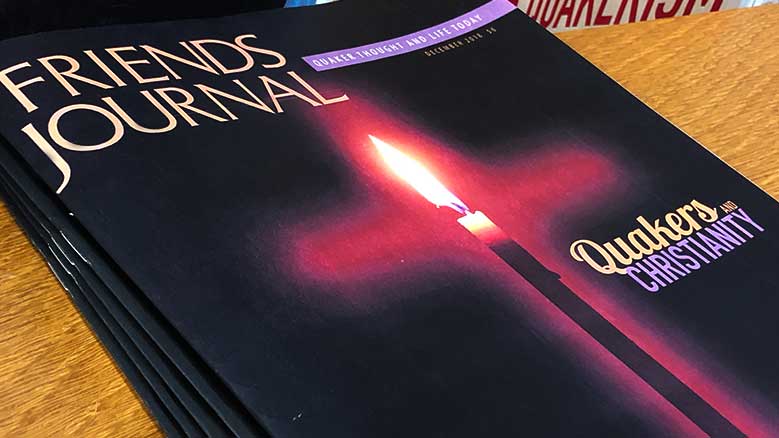Streams of Christianity
I appreciated that Friends Journal devoted its December 2018 issue to the topic of Quakers and Christianity, and that a wide variety of individual perspectives and personal experiences were included. Upon reflection, I realized that none of the articles featured a growing contemplative Christian movement, emerging from the writings of Thomas Keating, Cynthia Bourgeault, Richard Rohr, James Finley, and many others, who are resurrecting contemplative Christianity from its ancient, pre-creed and -dogma roots. This understanding of Jesus and early Christianity has a lot in common with what George Fox discovered in the 1600s.
I first learned of this movement when reading Wisdom Way of Knowing by Cynthia Bourgeault, who shows Christianity to be profoundly rooted in the ancient Wisdom tradition. As a Wisdom teacher, Jesus taught and lived out the path to inner spiritual transformation, which always requires surrender, detachment, compassion and forgiveness. I excitedly wrote to her, inquiring of her knowledge of Quakerism, and also sent her my CD of chants, Timeless Quaker Wisdom in Plainsong, thinking it could serve as an introduction. This opened a door to an amazing ongoing collaboration, with me attending her sought-after retreats (“Wisdom Schools”) to teach about Quaker spirituality through the words of early Friends I’d set to song, and with her leading “Quaker Wisdom Schools” to teach Quakers about spiritually transformative concepts and practices rooted in Christianity.
Paulette Meier
Cincinnati, Ohio
For me there is indeed no Christian Mysticism, just Mysticism. I relish the historical foundation of Quakerism in Christianity, but am really pleased to be rid of claims that Christianity is salvific. The real loss in language and experience is nothing specifically Christian, but rather the notion that there are no realms of being other than the physical.
Gervais Frykman
Wakefield, UK
On mediocrity
Gabbreell James notes, in “We Are Not John Woolman” (FJ Jan.), that we Quakers often bask in the mantle of John Woolman, Lucretia Mott, and Benjamin Lay, but we do not exert ourselves to match their sacrifices nor to defend the causes that they might embrace were they living today. While I am willing to plead, “Guilty as charged,” I will also make a plea for mediocrity in matters of Christian profession/confession. While these three paragons of Quaker courage and virtue often faced opposition from more trepid members of Quaker bodies, the fact that these three could take a courageous position at all required the existence of Quaker institutions that operated with all of the shortcomings that institutions typically engender.
Without a base of shared mediocrity, a prophetic testimony has no launching pad from which to emerge. And in fact, the Quaker base did not doubt the qualifications of women to take leadership roles, and certain yearly meetings did forbid the owning of slaves during the lifetime of John Woolman. (Some yearly meetings did not.) Compared to the great mass of American culture, these were noteworthy achievements, even if they fell far short of the best insights that some Quakers could offer at the time.
Moreover, if Quaker institutions did not survive today, imperfect though they certainly are, there would be (even) fewer people who would remember the fearless testimony of those Quaker paragons we wistfully recall. The vast Quaker burial grounds near Philadelphia are filled with people who, like us, failed to heed every counsel that the Light could offer them, yet collectively, their worship testified to greater possibilities than they could individually manifest.
Keith Barton
Berkeley, Calif.
What brilliant questions, laced with the stories of people that make sense of them: John Woolman, Lucretia Mott, Benjamin Lay, and Colin Kaepernick. I ask myself these questions—and continue to wrestle with them. I don’t want to be remembered, truly, but I want to have the courage to be a Quaker. I knew a few with that courage in the early 1980s at the Women’s Encampment for a Future of Peace and Justice, and they converted me from non-Quaker. I had some of the courage I admired in others when I was a professor of theatre in Virginia, and a teacher in the School District of Philadelphia, but since then have moved into the position of spectator. Spectating may have some value for people like me, and I have done it in workshop after workshop, but very little in the world.
Has it always been so few who step forward? What if a larger ground swell rose up, willing to revitalize the Religious Society of Friends with less tradition and more prophetic agitators? Will we be willing to let go of less effective practice and those who insist upon it?
The more I read of this revolutionary issue of Friends Journal, the more I have hope. Thank you for writing, Gabbreell. Thank you for your Quaker faith and courage.
Susan Chast
Lansdowne, Pa.
Much as I would love to claim that my Quaker practice is akin to the Quaker greats, I know I have blind spots and fall short. Thanks to Gabbreell for this call to accountability and to better practice. I will no longer stand aside when I see or hear Friends using our practice to silence dissent. I will allow the Holy to nudge my awakening as I more deeply commit to undoing racism.
Jeanne Marie Mudd
Arizona
It seems that we live in a time of “Do what I say, not what I do.” Where most “do” little or nothing. The few of us in the United States that are Quaker fold into the larger groups of activists and don’t stand out as upholding Quaker values. Without postulating, we need to identify ourselves, not for fame or history, but so that others know there are Friends where it is safe to ponder and act upon these issues. I am of the belief that many who check the box “spiritual but not religious” are really Quakers and just don’t know it, yet. Mindfulness, meditation, settling oneself, are popular ideas now—ones that we as Quakers have been doing since the beginning. Might there be a Mott, Lay, or Woolman out there right now and we just don’t know they are Quaker? We need to invite Kaepernick to a meeting. We need to join and support the activists of our time and proudly state that we are Friends.
Judy Reese
Upper Chichester, Pa.
While I appreciate and support the larger message of the piece, I was troubled from the outset by James’s characterization of the “support our troops” types. What better way to support our troops than to work toward preventing the actions that could lead them into harm’s way. The big lesson we learned from Vietnam was not to hold those sent to fight accountable for the sins of those that put them in that position.
I am from a long line of Quakers, and my mother, who served overseas in WWII, spent the remainder of her life supporting those troops who came home mentally wounded, at the same time she lobbied for peace. In her honor I donate to the United Service Organizations every year, as I work for peace and social justice in my daily life. Surely Quakers and progressives care about and support the lives and well-being of those young men and women who for whatever their reasons have chosen to serve in this manner. This is hardly the purview of the conservatives.
Sue Steinacher
Nome, Alaska
This article’s main message is a call to courageous faithfulness, in the face of staunch or long-standing opposition, in advocacy for a better world, especially for those among us who are most oppressed. That is a brave message which asks much of us. And it calls for our continuous and continual response to be grounded in deep discernment, divine assistance, and love for our communities, hopefully with the support of them.
Yes, that is a high aspiration, one that we might choose to avoid and, in so doing, we would indeed verify “We are not John Woolman.” I, for one, prefer to take up Gabbreell’s challenge and attempt to faithfully follow our Guide as fiercely as did those who I hold in high regard, knowing I will fail and try again innumerable times. Reflection on her queries scattered throughout this piece will help me illuminate that path.
Viv Hawkins
Philadelphia, Pa.
More takes on Quaker survival
Five months ago, I left Omaha Friends after attending for 25 years (“Can Quakerism Survive?” by Donald W. McCormick, FJ Feb. 2018). The meeting declined from 20 or so attenders to 2 or 3. This decline in a city area of over one million and several colleges was not understandable to us.
My reason for leaving was an underlying emphasis on progressive liberal ideology at the expense of any spiritual concerns. Second hour discussion would often devolve into an argument with someone walking away hurt. This became more extreme with the election of Trump. I didn’t vote, but the constant negative reaction was dispiriting.
My attraction to Quakers is the direct experience of the Light of Christ within, which Fox so elegantly described. This experience is very real to me, and I felt a kindred spirit in Fox. However, I had Quakers tell me the Light really doesn’t exist or is just a metaphor.
My attempts to refocus the meeting on Spirit was a lost cause. Quakers have a great potential to help lead toward a positive future by following leadings from that stillness rather than following others that have a darker agenda.
Frank Griffith
Bellevue, Neb.
I, too, have my discomfort with my meeting and find spiritual nurture more often than I wish in a traditional Anglican church that has included moments of silence into its liturgy. However, I miss our Quaker silence very much when I am away from it for too long. But too many egos spoil the soup, so to speak.
I can assure you the Inner Light is not a metaphor, but a very real manifestation that some of us are fortunate to experience on a conscious level. It doesn’t happen often, but can never be forgotten when it does reveal itself. For those who have not had that conscious experience, it is still within and they are no lesser for not yet having experienced it directly. Where metaphor comes in is when communicating spiritual experiences via storytelling, for how can one possibly describe the divine mystery directly in human language? But metaphor is secondary; it is not the experience itself, rather a pathway to it.
As the older generation has passed away from our yearly meeting, a massive loss of wisdom, it has left a huge gap. They were not a coddled generation, and their heartfelt fellowship cannot be replaced, it seems.





Comments on Friendsjournal.org may be used in the Forum of the print magazine and may be edited for length and clarity.